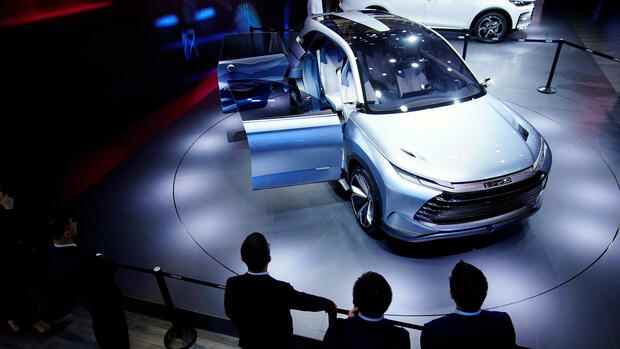Hamburg Sixt is adding electric cars from the leading Chinese carmaker BYD to its range. As a first step, Germany’s largest car rental company is ordering several thousand purely battery-powered vehicles, as the two companies announced on Monday.
Sixt customers should be able to book the first cars in the next few weeks – starting in Germany, France, the Netherlands and Great Britain. It starts with the E-SUV Atto 3 from BYD. Sixt plans to buy around 100,000 more electric cars over the next six years. Sixt and BYD did not comment on the financial volume of their cooperation.
The partnership gives BYD (“Build Your Dreams”) a powerful boost in the competition among Chinese car manufacturers for one of the top spots in expansion in Europe. Possible further cooperations in different regions of the world would also be explored.
To this day, BYD, Xpeng, Aiways, SAIC and other manufacturers from China who are hardly known in this country are feeling their way rather than flooding the market with electric vehicles. In the meantime, however, the announcements are increasing. The car manufacturer Nio wants to inform about its plans for Europe on Friday in Berlin.
Top jobs of the day
Find the best jobs now and
be notified by email.
Sixt wants to convert most of its rental car fleet in Europe to electric vehicles over the next eight years and is relying on various manufacturers and models. By 2030, 70 to 90 percent of the cars should be electric.
BYD is venturing west and booming in China
BYD wants to benefit from Bayern’s strategy. The company, which is based in the Chinese tech metropolis of Shenzhen, was only known to insiders in the automotive industry for a long time. And that despite the fact that Berkshire Hathaway, owned by US star investor Warren Buffett, has been one of the group’s largest shareholders for years.
By 2030, 70 to 90 percent of cars should be electric.
(Photo: dpa)
But BYD now sells more electrified vehicles worldwide than Tesla and is also being perceived more strongly in the West. The BYD business is booming, especially in China. The company was able to sell around 966,000 cars in the People’s Republic from January to August. This corresponds to an increase of 163 percent compared to the previous year.
No other car manufacturer is growing so rapidly at such a high level. In the ranking of China’s top-selling vehicle manufacturers, BYD has moved up from tenth to fourth place. Only Honda, Toyota and Volkswagen are currently delivering more vehicles.
With the Song SUV, the Han and Qin sedans and the Dolphin compact car, BYD currently offers four of the eleven best-selling passenger cars in China. For the past four months, the group has been consistently breaking its own sales records. According to the statistics portal BSCB, sales in China in March were still 105,000 vehicles, but most recently they were already 169,000 units.
Now BYD is increasingly pushing towards Europe. The Hedin Mobility Group takes care of distribution, sales and service for the Chinese in Germany. The Swedish group operates more than 230 car dealerships in eight countries, making it one of the largest private car dealerships in Europe.
Expert: China’s manufacturers can deliver more than German ones
With Sixt, BYD has now gained another important partner. At the same time, the cooperation is attractive for the Bavarians, states Stefan Bratzel, Director of the Center of Automotive Management (CAM): “When it comes to electric cars, the Chinese are much more able to deliver than the German car manufacturers.” BMW or Opel sometimes wait more than a year.
>> Read here: Chinese electric car manufacturer Nio ventures into Germany
“A mobility player like Sixt has to make sure it stays competitive here. In this respect, the partnership with BYD is only logical,” says Bratzel. He assumes that Sixt and other car rental companies will announce similar partnerships with a number of other Chinese providers. “Electromobility is changing the landscape – the German car manufacturers have to dress warmly.”
In the first half of the year, the domestic car brands in Germany have already lost market share compared to French, Korean and American suppliers in the case of pure electric vehicles. With the increased presence of Chinese manufacturers such as BYD, Great Wall or Nio, there is a risk of further losses. Especially since the quality of the Chinese brands is very good, explains Bratzel.
BYD stands out in part because, unlike many Western providers of battery electric vehicles, the group has a high degree of vertical integration. BYD produces the batteries and cells for its models itself, as well as the electric drives.
The group’s “Blade Battery” looks like the blade of a sword, enables ranges of around 600 kilometers according to the European test standard WLTP and impresses with a service life of 1.2 million kilometers. The batteries seem to be so good that even the American electric car pioneer Tesla wants to use them.
More: Sixt is switching to electric cars: “Cheaper than comparable cars with combustion engines”
